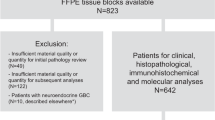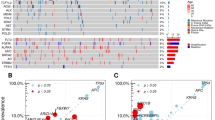Abstract
Background
Comprehensive genomic analysis of paired primary tumors and their metastatic lesions may provide new insights into the biology of metastatic processes and therefore guide the development of novel strategies for intervention. To date, our knowledge of the genetic divergence and phylogenetic relationships in gallbladder cancer (GBC) is limited.
Methods
We performed whole exome sequencing for 5 patients with primary tumor, metastatic lymph node (LNM) and corresponding normal tissue. Mutations, mutation signatures and copy number variations were analyzed with state-of-art bioinformatics methods. Phylogenetic tree was also generated to infer metastatic pattern.
Results
Five driver mutations were detected in these patients. Among which, TP53 was the only shared mutation between primary tumor and LNM. Although tumor mutational burden was comparable between primary tumor and LNM, higher mutation burden was observed in LNM of one patient. Copy number variations (CNVs) burden was higher in LNM than their primary tumor. Phylogenetic analysis indicated both linear and parallel progression of metastasis exist in these patients. TP53 mutation and CNVs were homogenously between primary tumor and LNM.
Conclusions
High consistence of genetic landscape were shown between primary tumor and LNM in GBC. However, heterogenicity still exist between primary tumor and LNM in particular patients in term of driver mutation, TMB and CNV burden. Phylogenetic analysis indicated both Linear and parallel progression of metastasis were exist among these patients.



Similar content being viewed by others
Data availability
All raw data is available, and is ready to share.
Code availability
All the software used in this manuscript is available online, and there is no custom code.
References
Duffy A et al (2008) Gallbladder cancer (GBC): 10-year experience at Memorial Sloan-Kettering Cancer Centre (MSKCC). J Surg Oncol 98(7):485–489
Bray FI et al (2018) Global cancer statistics 2018: GLOBOCAN estimates of incidence and mortality worldwide for 36 cancers in 185 countries. CA: Cancer J Clin 68(6):394–424
Schmidt MA, Marcano-Bonilla L, Roberts LR (2019) Gallbladder cancer: epidemiology and genetic risk associations. Chin Clin Oncol 8(4):2
Lai CHE, Lau WY (2008) Gallbladder cancer—a comprehensive review. Surg 6(2):101–110
Kanthan R et al (2015) Gallbladder cancer in the 21st century. J Oncol 2015:967472
Lin J et al (2019) Precision oncology for gallbladder cancer: insights from genetic alterations and clinical practice. Ann Transl Med 7(18):44
Haber PK, Sia D (2019) Translating cancer genomics for precision oncology in biliary tract cancers. Discov Med 28(155):255–265
Valle JW et al (2017) New horizons for precision medicine in biliary tract cancers. Cancer Discov 7(9):943–962
Li M et al (2014) Whole-exome and targeted gene sequencing of gallbladder carcinoma identifies recurrent mutations in the ErbB pathway. Nat Genet 46(8):872–876
Nakamura H et al (2015) Genomic spectra of biliary tract cancer. Nat Genet 47(9):1003–1010
Jiao Y et al (2013) Exome sequencing identifies frequent inactivating mutations in BAP1, ARID1A and PBRM1 in intrahepatic cholangiocarcinomas. Nat Genet 45(12):1470–1473
Li L et al (2020) Genetic heterogeneity between paired primary and brain metastases in lung adenocarcinoma. Clin Med Insights Oncol 14:1179554920947335
Jiang T et al (2020) Mutational landscape and evolutionary pattern of liver and brain metastasis in lung adenocarcinoma. J Thorac Oncol 16:237–249
Li C et al (2019) Mutational landscape of primary, metastatic, and recurrent ovarian cancer reveals c-MYC gains as potential target for BET inhibitors. Proc Natl Acad Sci USA 116(2):619–624
Ng CKY et al (2017) Genetic heterogeneity in therapy-naïve synchronous primary breast cancers and their metastases. Clin Cancer Res 23(15):4402–4415
Dai W et al (2017) Whole-exome sequencing reveals critical genes underlying metastasis in oesophageal squamous cell carcinoma. J Pathol 242(4):500–510
Ouyang L et al (2014) Whole-genome sequencing of matched primary and metastatic hepatocellular carcinomas. BMC Med Genomics 7:2
Alexandrov LB et al (2015) Clock-like mutational processes in human somatic cells. Nat Genet 47(12):1402–1407
Li H, Durbin R (2009) Fast and accurate short read alignment with Burrows-Wheeler transform. Bioinformatics 25(14):1754–1760
Li H et al (2009) The sequence alignment/map format and SAMtools. Bioinformatics 25(16):2078–2079
Reiter JG et al (2017) Reconstructing metastatic seeding patterns of human cancers. Nat Commun 8:14114
Hu Z et al (2020) Multi-cancer analysis of clonality and the timing of systemic spread in paired primary tumors and metastases. Nat Genet 52(7):701–708
Talevich E et al (2016) CNVkit: genome-wide copy number detection and visualization from targeted DNA sequencing. PLoS Comput Biol 12(4):e1004873–e1004873
Martincorena I, Campbell PJ (2015) Somatic mutation in cancer and normal cells. Science 349(6255):1483–1489
Poulos RC, Wong JWH (2019) Finding cancer driver mutations in the era of big data research. Biophys Rev 11(1):21–29
Martincorena I et al (2017) Universal patterns of selection in cancer and somatic tissues. Cell 171(5):1029-1041.e21
Waddell N et al (2015) Whole genomes redefine the mutational landscape of pancreatic cancer. Nature 518(7540):495–501
Gerlinger M et al (2014) Genomic architecture and evolution of clear cell renal cell carcinomas defined by multiregion sequencing. Nat Genet 46(3):225–233
Turajlic S, McGranahan N, Swanton C (2015) Inferring mutational timing and reconstructing tumour evolutionary histories. Biochim Biophys Acta 1855(2):264–275
Hong WS, Shpak M, Townsend JP (2015) Inferring the origin of metastases from cancer phylogenies. Cancer Res 75(19):4021–4025
Wardell CP et al (2018) Genomic characterization of biliary tract cancers identifies driver genes and predisposing mutations. J Hepatol 68(5):959–969
Lamarca A et al (2020) Molecular targeted therapies: ready for “prime time” in biliary tract cancer. J Hepatol 73(1):170–185
Athauda A et al (2020) Broadening the therapeutic horizon of advanced biliary tract cancer through molecular characterisation. Cancer Treat Rev 86:101998
Goldstein D, Lemech C, Valle J (2017) New molecular and immunotherapeutic approaches in biliary cancer. ESMO Open 2(Suppl 1):e000152
Javle M et al (2016) Biliary cancer: utility of next-generation sequencing for clinical management. Cancer 122(24):3838–3847
Xu S et al (2019) Genome-wide CRISPR screen identifies ELP5 as a determinant of gemcitabine sensitivity in gallbladder cancer. Nat Commun 10(1):5492
Reiter JG et al (2019) An analysis of genetic heterogeneity in untreated cancers. Nat Rev Cancer 19(11):639–650
Wei Q et al (2017) Multiregion whole-exome sequencing of matched primary and metastatic tumors revealed genomic heterogeneity and suggested polyclonal seeding in colorectal cancer metastasis. Ann Oncol 28(9):2135–2141
Wan L, Pantel K, Kang Y (2013) Tumor metastasis: moving new biological insights into the clinic. Nat Med 19(11):1450–1464
Lamarca A et al (2020) Current standards and future perspectives in adjuvant treatment for biliary tract cancers. Cancer Treat Rev 84:101936
Mehrotra R et al (2018) Genetic landscape of gallbladder cancer: global overview. Mutat Res-Rev Mutat Res 778:61–71
Sylvester BE, Vakiani E (2015) Tumor evolution and intratumor heterogeneity in colorectal carcinoma: insights from comparative genomic profiling of primary tumors and matched metastases. J Gastrointest Oncol 6(6):668–675
Lee SY et al (2014) Comparative genomic analysis of primary and synchronous metastatic colorectal cancers. PLoS One 9(3):e90459
Barroso-Sousa R et al (2020) Tumor mutational burden and PTEN alterations as molecular correlates of response to PD-1/L1 blockade in metastatic triple-negative breast cancer. Clin Cancer Res 26(11):2565–2572
Goodman AM et al (2017) Tumor mutational burden as an independent predictor of response to immunotherapy in diverse cancers. Mol Cancer Ther 16(11):2598–2608
McNamara MG et al (2020) Impact of high tumor mutational burden in solid tumors and challenges for biomarker application. Cancer Treat Rev 89:102084
Hatakeyama K et al (2018) Tumor mutational burden analysis of 2,000 Japanese cancer genomes using whole exome and targeted gene panel sequencing. Biomed Res 39(3):159–167
Chalmers ZR et al (2017) Analysis of 100,000 human cancer genomes reveals the landscape of tumor mutational burden. Genome Med 9(1):34
Wang D et al (2019) Multiregion sequencing reveals the genetic heterogeneity and evolutionary history of osteosarcoma and matched pulmonary metastases. Cancer Res 79(1):7–20
Hallam S et al (2020) The transition from primary colorectal cancer to isolated peritoneal malignancy is associated with an increased tumour mutational burden. Sci Rep 10(1):18900
Robinson D et al (2015) Integrative clinical genomics of advanced prostate cancer. Cell 161(5):1215–1228
Campbell PJ et al (2010) The patterns and dynamics of genomic instability in metastatic pancreatic cancer. Nature 467(7319):1109–1113
Yates LR et al (2015) Subclonal diversification of primary breast cancer revealed by multiregion sequencing. Nat Med 21(7):751–759
Priedigkeit N et al (2017) Intrinsic subtype switching and acquired ERBB2/HER2 amplifications and mutations in breast cancer brain metastases. JAMA Oncol 3(5):666–671
Hosseini H et al (2016) Early dissemination seeds metastasis in breast cancer. Nature 540(7634):552–558
Yang Y et al (2020) A predictive nomogram for lymph node metastasis of incidental gallbladder cancer: a SEER population-based study. BMC Cancer 20(1):828
Funding
There is no funding for current work.
Author information
Authors and Affiliations
Contributions
XFX and BQF performed WES, critical data analyses, interpretation of results and wrote the manuscript. XFX performed DNA extraction, analyzed the data and carried out statistical analyses. BQF contributed samples and analyzed clinical data. BQF and XHW designed, implemented the study, wrote and critically reviewed the manuscript. This is to confirm that all authors read and approved the final manuscript.
Corresponding author
Ethics declarations
Conflict of interest
There is no conflicts of interest for all authors.
Ethical approval
Since this is an retrospective diagnostic study, no previous agreement from our Ethical Committee was obtained.
Consent to participate
Not applicable.
Consent for publication
Not applicable.
Research involving human and animal participants
Additional declarations for articles in life science journals that report the results of studies involving humans and/or animals.
Additional information
Publisher's Note
Springer Nature remains neutral with regard to jurisdictional claims in published maps and institutional affiliations.
Supplementary Information
Below is the link to the electronic supplementary material.
Rights and permissions
About this article
Cite this article
Fan, B., Xu, X. & Wang, X. Mutational landscape of paired primary and synchronous metastatic lymph node in chemotherapy naive gallbladder cancer. Mol Biol Rep 49, 1295–1301 (2022). https://doi.org/10.1007/s11033-021-06957-y
Received:
Accepted:
Published:
Issue Date:
DOI: https://doi.org/10.1007/s11033-021-06957-y




